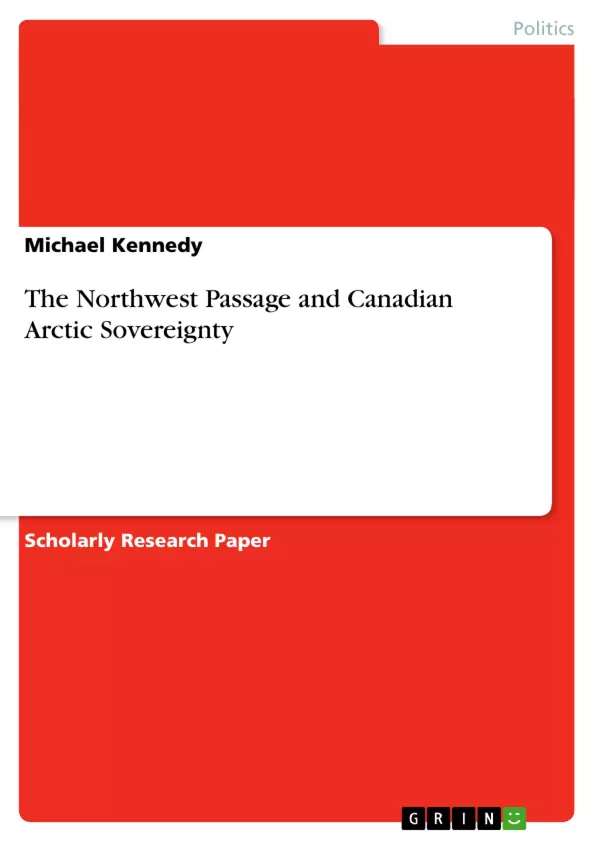This paper discusses the right of passage through the disputed Northwest Passage within the Canadian Archipelago. Varying claims made by the international community are analysed with a heavy focus on Canada and the United States. Furthermore, differing resolutions to the issues involved are compared in an attempt to come to a solution beneficial to all parties. The intention of this paper is to draw a conclusion as to which claims are valid in accordance with international law, establish an accurate definition of national sovereignty, and apply these findings to the various claims put forth. Continued Canadian strategies to solidify claims and the natural environment of the Arctic are also discussed.
Inhaltsverzeichnis (Table of Contents)
- Introduction
- The Northwest Passage
- Canada's Claim to Sovereignty
- International Law and Arctic Sovereignty
- The United States' Position
- United States' Argument
- The Role of the United Nations
- A Possible Compromise
- Conclusion
Zielsetzung und Themenschwerpunkte (Objectives and Key Themes)
This paper analyzes the dispute over the Northwest Passage, focusing on the conflicting claims of Canada and the United States regarding passage rights through the Canadian Archipelago. The paper aims to determine which claims are valid under international law and establish a clear definition of national sovereignty. The key themes explored include:- Arctic Sovereignty: The paper examines the competing claims of various nations to Arctic territory, focusing on Canada's assertion of sovereignty over the Northwest Passage.
- Right of Passage: The paper delves into the legal arguments regarding whether the Northwest Passage is an international strait open to free navigation or internal waters requiring Canada's consent for passage.
- International Law: The paper analyzes the relevant international law frameworks and conventions pertaining to Arctic sovereignty, including the United Nations Convention on the Law of the Sea (UNCLOS).
- Environmental Concerns: The paper addresses the environmental risks associated with increased maritime traffic through the Northwest Passage, particularly with regard to potential oil spills and damage to the Arctic ecosystem.
- Potential for Conflict: The paper explores the potential for international conflict arising from the unresolved dispute over the Northwest Passage and examines the relationship between Canada and the United States, as well as Canada and Russia, in the context of this dispute.
Zusammenfassung der Kapitel (Chapter Summaries)
- Introduction: Introduces the dispute over the Northwest Passage and the varying claims made by Canada, the United States, and other nations. Highlights the significance of the Arctic region in terms of natural resources and potential for future shipping routes.
- The Northwest Passage: Provides a detailed description of the Northwest Passage, its geographic location, and its potential strategic and economic importance as a navigable route between the Atlantic and Pacific Oceans. Discusses the impact of climate change on the melting of the polar ice cap and the subsequent opening of the Passage.
- Canada's Claim to Sovereignty: Outlines Canada's longstanding assertion of sovereignty over the Northwest Passage, arguing that the waters within the Canadian Archipelago are internal waters and require Canadian consent for passage.
- International Law and Arctic Sovereignty: Examines the legal frameworks relevant to the dispute, focusing on the United Nations Convention on the Law of the Sea (UNCLOS) and its provisions related to territorial seas, straits, and passage rights.
- The United States' Position: Presents the United States' position that the Northwest Passage is an international strait open to free navigation for all nations, citing its importance for global trade and transportation.
- United States' Argument: Delves into the legal arguments presented by the United States, emphasizing its contention that the Northwest Passage qualifies as a strait under international law and is subject to the right of innocent passage for all vessels.
- The Role of the United Nations: Explores the role of the United Nations in the dispute, analyzing its responses to the conflicting claims of Canada and the United States, and its efforts to facilitate a negotiated resolution.
- A Possible Compromise: Discusses potential avenues for compromise, acknowledging the shared interests of Canada and the United States, as well as the importance of maintaining international cooperation and environmental protection.
Schlüsselwörter (Keywords)
The paper explores the complex issue of Arctic sovereignty, focusing on the competing claims of Canada and the United States regarding the Northwest Passage. Key terms and concepts include: Arctic sovereignty, Northwest Passage, right of passage, international law, UNCLOS, international strait, internal waters, territorial seas, environmental concerns, potential for conflict, and Canada-United States relations.Frequently Asked Questions
What is the central conflict regarding the Northwest Passage?
The conflict involves a dispute over sovereignty and passage rights: Canada claims the passage as internal waters, while the United States and others view it as an international strait open to free navigation.
How does international law, specifically UNCLOS, apply to this dispute?
The United Nations Convention on the Law of the Sea (UNCLOS) provides the framework for defining territorial seas and international straits, but both Canada and the US interpret its provisions differently to support their claims.
Why is the Northwest Passage becoming more strategically important?
Due to climate change and the melting of polar ice, the passage is becoming more navigable, offering a potentially shorter and more economical shipping route between the Atlantic and Pacific Oceans.
What are the environmental concerns related to the Arctic waters?
Increased maritime traffic raises the risk of oil spills and other environmental damage that could devastate the fragile Arctic ecosystem and its natural resources.
What is Canada's primary argument for sovereignty?
Canada argues that the waters within the Canadian Archipelago are historic internal waters, meaning full Canadian consent and regulation are required for any foreign vessel to pass through.
Is there a possibility for a compromise in this Arctic dispute?
The paper discusses potential avenues for compromise that acknowledge shared interests in security, trade, and environmental protection while maintaining international cooperation.
- Arbeit zitieren
- Michael Kennedy (Autor:in), 2011, The Northwest Passage and Canadian Arctic Sovereignty, München, GRIN Verlag, https://www.grin.com/document/206459



